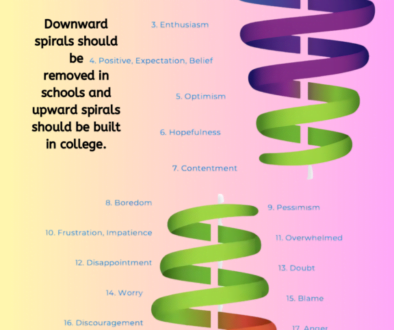Sound career decisions are highly subjective and based on non tangible data:
Subjective data is data that cannot be easily measured or quantified, such as personal interests, values, and passions. Such data is not easy to work with when it comes to making career decisions, especially by parents for their kids and the survey results depict the same, for example – A recent survey by the National Association of Colleges and Employers (NACE) found that only 27% of college graduates are working in a job that is closely related to their major.

This means that the majority of college graduates are not working in a job that is directly related to their field of study and the three reasons sighted for this were A. Lack of job opportunities & competition, B. Unrealistic expectations from their point of view and C. personal reasons.
It is also highly likely these 27% of college graduates really thought their way through (especially from A-C) towards their career planning, picked the right programs and industry clusters, they imagined themselves in the right career designations, they validated such scenarios by physically visiting colleges and places or people and it is also likely that they knocked off career choices with subjective reasoning and problem solving skills where they observed their aptitude interest inclination but not of their personal interest.
It is specific skills and not high paying industry major program that will strengthen your career decisions:
But most of all A-C are such aspect that will evolve and change, be it job opportunities and or personal value. Hence there has to be a very high probability that these 27% must have something which the other 73% did not, which I think is problem solving, grit and resilience. Of course, not every Ivy League graduate will be successful in the traditional sense, but those who are, definitely have such skills.
Some may choose to pursue careers that are not as lucrative or prestigious as others (as they might have personal reasons which they have high regards for) and still the world has witnessed convicted white collar criminals such as Raj Rajaratnam and Michael Milken who graduated from Ivy League – U Penn as well.
Hence it is worth noting that these schools often attract students who are intelligent, ambitious, and driven. Which path your child is heading, is in true sense a parental responsibility to detect, correct and teach.
As simple as it may sound, but choosing the BEST career path is really tough for parents and their kids, cause you cannot accurately measure personal interest and passion on a metric scale, however but there are thoughtful ways to identify true interests and to make sense of such data, so here are a few ways to measure personal interest indirectly in a child.
Subjective measurements towards career decisions:
One way is to ask them to rate their interest in different topics on a scale of 1 to 10 (this is mildly accurate as it is quick). Another way is to measure and track the amount of time kids spend on different activities (great way to see what skills they have tough time to master). For example, you could track the number of hours kids spend in reading, doing homework, rejuvenating etc. this way you will be able to really get a sense of their true interest and level of skills (it is important to understand what you are measuring).
For today’s teenagers another great way to quantify personal interest is to look at their social media activity. For example, you could track the number of times kids post about which topics on social media (however most kids would take this as parents spying on them, but if they are giving the reason and counselled properly then most would willingly share and participate).
Be cautious if they are making instant and quick decisions to choose a career path for themselves (do you detect restlessness?), try to be thoughtful in questioning such skills – what is the real basis for my child towards getting attracted to such a career path, is it – high renumeration, prestige that comes with such a career path, ease of earning, sitting in one place and doing all the work, attaining power of some sort etc.
However, many parents make the mistake of making quick and non-thoughtful decisions about their child’s career. Being thoughtful is the most important skill required to come to a sound decision, weighing in pros and cons of each career path, if there is a BEST FIT career path coming out from an assessment results, then what could be possible reasons for the family to not pursue it? Can a potential career path delimit an essential life skill that might bring greater satisfaction in the long run?
What were the total number of novel questions or concerns that the child expressed when a suitable career choice was given to the child? Is the parent able to imagine the child in such a career and living it day in and day out and still be able to foresee satisfaction and happiness as well?
Parent problem solving skills importance when making sound career decisions:
When parents wish to fulfil their duty of identifying the best career and life options for their child, then they might seek help from friends and family or attain professional help. However at times they are unable to assess the best course of action simply cause they aren’t able to deploy a very important skill which is – Problem solving with subjective & non tangible data, this is a critical skill that is essential for success in school, work, and life.
This skill when being used on non quantifiable data can lead to stress and anxiety and desired grooming might not be observed in kids. However It is the only skill and ability to identify and effectively overcome challenges in order to achieve a desired outcome.
Here are some statistics on problem solving skills in human beings:
According to a study by the World Economic Forum, problem solving skills are one of the top three skills that will be in demand in the future workforce, A study by the National Association of Colleges and Employers found that 77% of employers say that problem solving skills are important for new hires, A study by the Partnership for 21st Century Skills found that only 42% of high school graduates have the problem solving skills needed for success in college and careers.
If Problem solving skills are needed for success in college and careers then it is certainly needed for making sound career decisions as well.
Present day driving factors in parents while making sound career decisions for their kids:
- A 2019 study by the Pew Research Center found that 84% of parents in the United States said that they wanted their children to have a better life than they did. The study also found that 72% of parents said that they were concerned about the future of their children. A parent who has experienced extremely tough childhood is most likely to be biased with regards to hardships, however it is important to note that hardships are a part of life and that no child can be completely shielded from them.
- A study by the University of California, Berkeley found that people who made fast and quick decisions were more likely to succeed in a business simulation game. However, other research suggests that fast and quick problem solving decisions can be less effective. For example, a study by the University of Pennsylvania found that people who made fast and quick decisions were more likely to make mistakes, hence the swiftness of thoughtfulness in a parent who makes a quick decisions in their life can lead to the child making a mistake, simply because it is not thoughtful.
- A parent is unable to detect when their child is not being thoughtful and softly pesters parents to get things done. Parents must help their children to weather the storms of life and emerge stronger and more resilient and at times observing their child developing resilience skills before entering university irrespective of a career path is the only way to develop true confidence towards realising that the child will make an excellent future of themselves.
Outcome of career decisions:
Naturally parent expect that career path of their child will lead them to great heights, both socially and professionally. But if only 27% are accurately and well placed in their education and pursuing their careers then it becomes a topic of great discussion. Outcome of a career decisions will only be what you show you child, what you can truly understand, so if you show wealth and prosperity only, your child will show you that along with the parameters that you explained and showed as well.
Definitely give your kids means to earn and create wealth for themselves but also equip your self first to understand how to guide them upfront so that they acquire core values of being good, there by living a fulfilling life with enriching experiences.
Satyam Khanna


